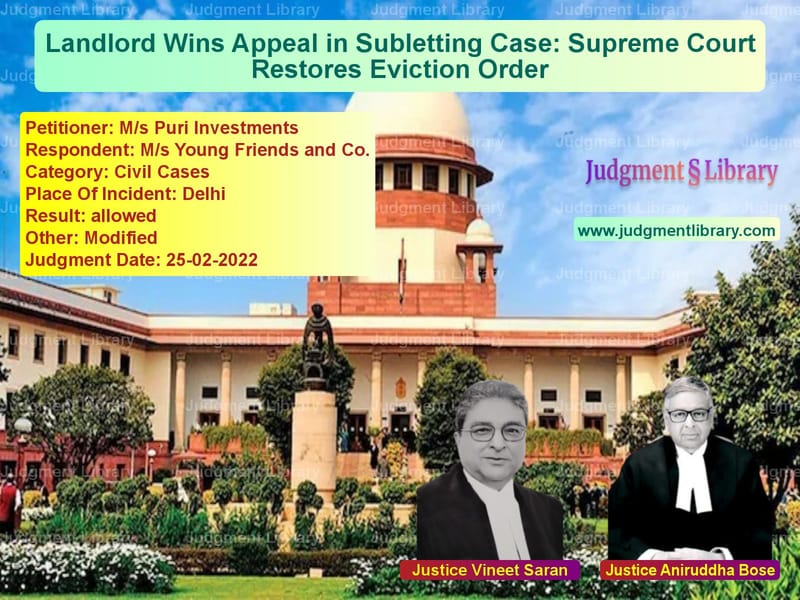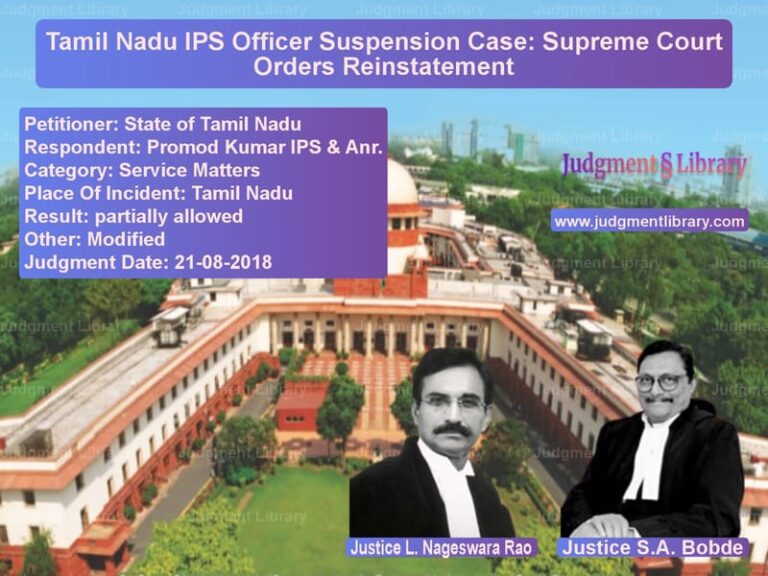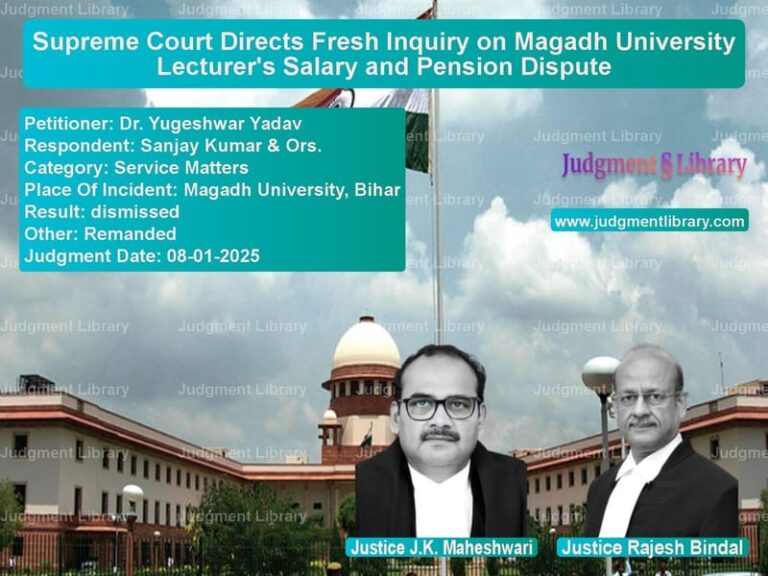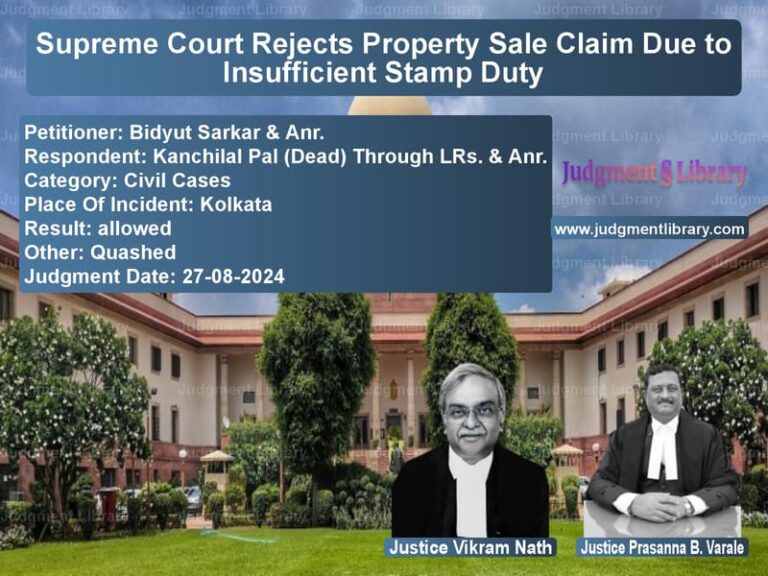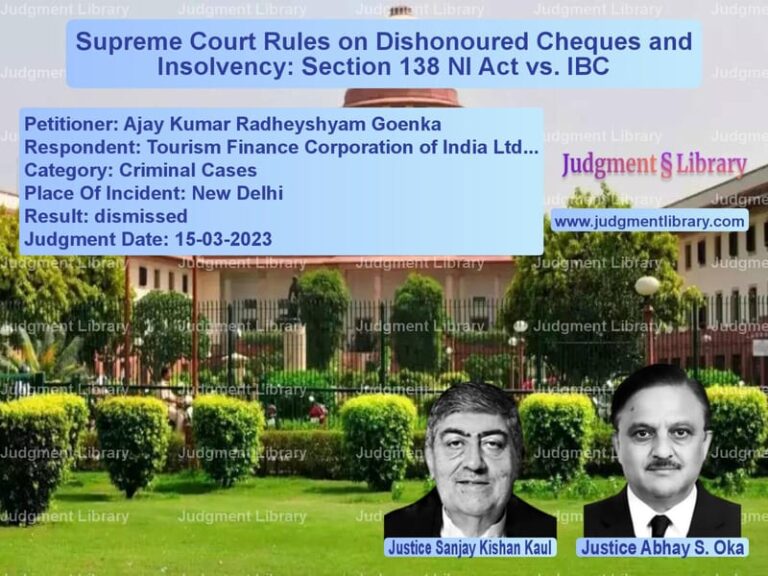Landlord Wins Appeal in Subletting Case: Supreme Court Restores Eviction Order
The Supreme Court, in its judgment dated February 23, 2022, has ruled in favor of M/s Puri Investments, restoring an eviction order against M/s Young Friends and Co., based on subletting under the Delhi Rent Control Act, 1958. The Court overturned the decision of the Delhi High Court and upheld the Appellate Tribunal’s eviction order, while also addressing the issue of occupation charges and eviction timelines.
Background of the Case
The appellant, M/s Puri Investments, is the landlord of a shop located in Connaught Place, New Delhi. The property was originally rented to the proprietor of M/s Young Friends and Co. in 1936. In 1974, the appellant initiated an eviction proceeding against the tenant, alleging subletting and non-payment of rent. The main ground for eviction was the alleged subletting of the premises by the tenant to three medical practitioners and two firms without the landlord’s consent.
The matter has been in litigation for several years, with multiple hearings and findings:
- 1997: The Additional Rent Controller (ARC) dismissed the eviction petition, ruling that there was no evidence of subletting or parting with possession of the premises.
- 2007: The Appellate Rent Control Tribunal (ARCT) reversed this decision and ordered eviction based on the subletting of the property to the medical practitioners.
- 2018: The Delhi High Court intervened, setting aside the ARCT’s order and restoring the ARC’s decision, ruling that the medical practitioners were not in exclusive possession and that there was no subletting.
- 2022: The Supreme Court heard the appeal and restored the eviction order, allowing the landlord’s claim.
Arguments Presented
Petitioner’s (Landlord’s) Arguments
The appellant’s counsel argued:
- The tenant had unlawfully sublet the premises to three medical practitioners (including a dentist) without the landlord’s consent.
- The tenant’s act of allowing these medical practitioners exclusive use of parts of the premises constitutes subletting, as they had separate phone lines, and were in exclusive possession during their practice hours.
- There was no evidence to suggest that the tenant retained control over the sublet areas or that the tenants were merely permissive users.
Respondent’s (Tenant’s) Arguments
The respondents countered:
- The tenant continued to retain control over the premises, and the medical practitioners’ use was permissive, with the tenant still exercising physical and legal possession.
- There was no monetary consideration involved in allowing the doctors to use the premises, and therefore no subletting could be established.
- Even if the medical practitioners were given access, it was for a limited time during their clinic hours, not an exclusive right.
Supreme Court’s Observations
On the Nature of Subletting
The Court concluded:
“Subletting occurs when the tenant parts with exclusive possession, either in whole or in part, without the consent of the landlord. Here, the doctors occupied exclusive portions of the premises during fixed hours, with separate telephone lines and a professional setup, clearly indicating subletting.”
The Court noted that the exclusive use of parts of the premises by the doctors, especially with separate facilities, was a clear indication of subletting. The Court emphasized that the tenant’s argument about retention of physical control did not suffice.
On Evidence of Subletting
The Court examined the evidence presented:
“Though the tenant may have continued to have access to the premises, the establishment of independent working spaces for the medical practitioners, with facilities such as telephone lines, indicates exclusive possession by the subtenants.”
The Court further explained that it is not necessary to establish a formal contract for subletting; the mere transfer of possession is sufficient to prove subletting.
On the High Court’s Interference
The Court found that:
“The High Court misapplied its supervisory powers under Article 227 of the Constitution, as it re-appreciated the facts and evidence, which is not the role of a supervisory court.”
The Court clarified that the High Court had overstepped by reconsidering factual findings made by the Appellate Tribunal and the Rent Controller, which were based on the evidence presented in the case.
Final Judgment
The Supreme Court ruled:
- The eviction order passed by the Appellate Tribunal was restored.
- The tenant’s claim that the doctors’ use was merely permissive was rejected.
- The respondent must vacate the premises within 53 weeks, and pay occupation charges for the period of their continued possession.
Implications of the Judgment
This judgment has significant implications:
- Clarification on Subletting: The ruling reinforces the principle that exclusive possession, even if temporary and without formal agreements, constitutes subletting.
- Judicial Oversight: The Court highlights the limited role of High Courts in supervising factual findings of lower courts, emphasizing judicial discipline.
- Eviction Orders: The decision affirms the importance of controlling unauthorized subletting, providing landlords with a mechanism to reclaim their properties.
The Supreme Court’s decision reinforces the importance of upholding contractual agreements, particularly concerning the use and subletting of rented properties.
Petitioner Name: M/s Puri Investments.Respondent Name: M/s Young Friends and Co..Judgment By: Justice Vineet Saran, Justice Aniruddha Bose.Place Of Incident: Delhi.Judgment Date: 25-02-2022.
Don’t miss out on the full details! Download the complete judgment in PDF format below and gain valuable insights instantly!
Download Judgment: ms-puri-investments-vs-ms-young-friends-an-supreme-court-of-india-judgment-dated-25-02-2022.pdf
Directly Download Judgment: Directly download this Judgment
See all petitions in Contract Disputes
See all petitions in Property Disputes
See all petitions in Specific Performance
See all petitions in Judgment by Vineet Saran
See all petitions in Judgment by Aniruddha Bose
See all petitions in allowed
See all petitions in Modified
See all petitions in supreme court of India judgments February 2022
See all petitions in 2022 judgments
See all posts in Civil Cases Category
See all allowed petitions in Civil Cases Category
See all Dismissed petitions in Civil Cases Category
See all partially allowed petitions in Civil Cases Category

